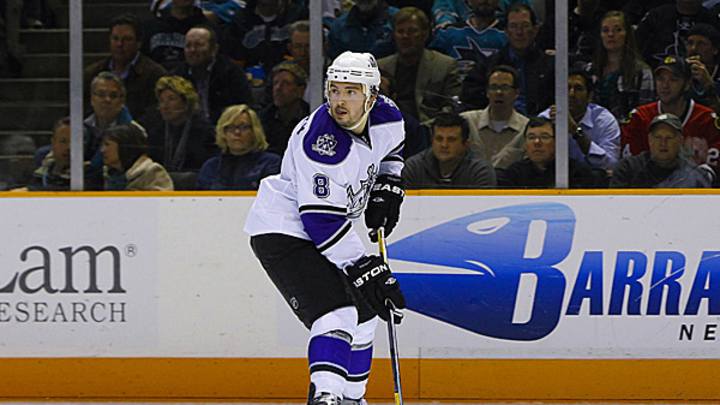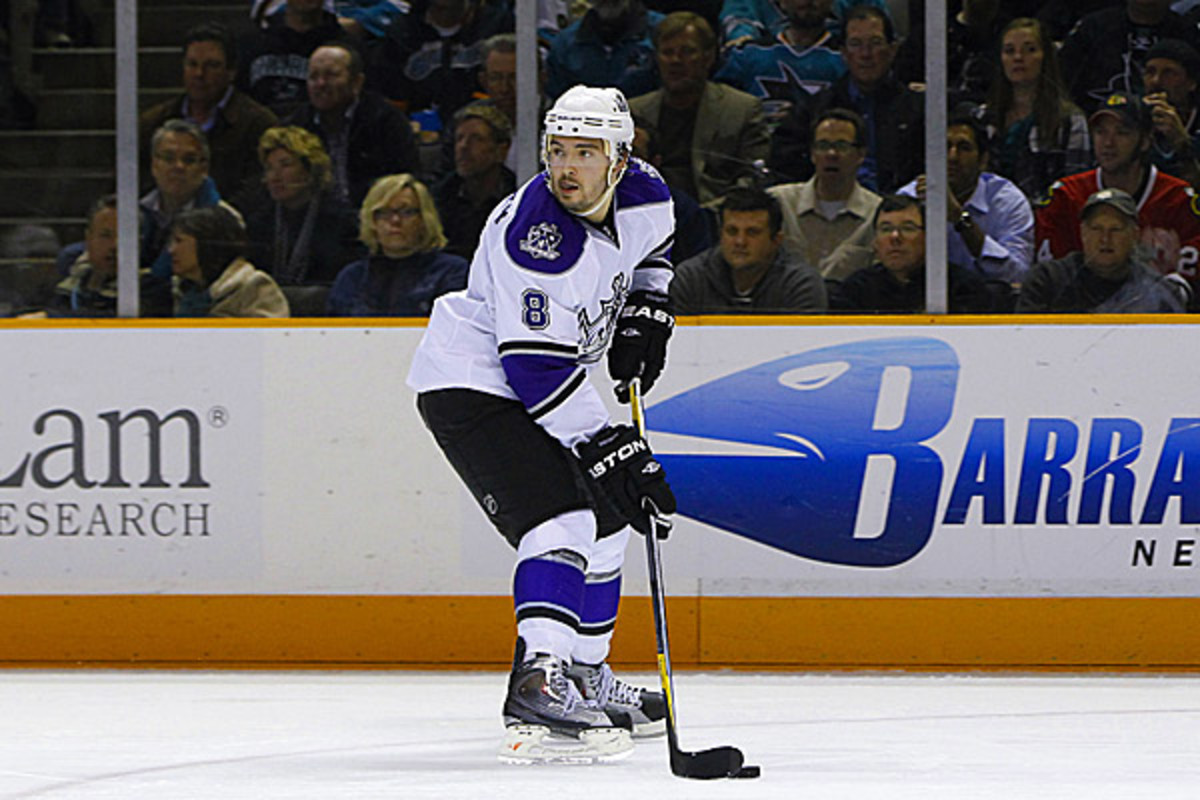The fallout from Weber's award

All eyes are now on the contract negotiations between the Kings and RFA defenseman Drew Doughty. (Jason O. Watson/U.S. Presswire)

By Stu Hackel
Now that Shea Weber's arbitration award is settled, what will the immediate ripple effect be on the remaining top unsigned NHL defensemen -- Drew Doughty of the Kings, Luke Schenn of the Maple Leafs, and the Jets' Zach Bogosian?
The one-year $7.5 million salary that Weber received is the largest arbitration award in NHL history and it makes him the NHL's top-earning defenseman, bypassing the Florida Panthers' Brian Campbell, who pulls down slightly over $7.1 million per season. That in itself is crucial because it will provide a standard for all other defensemen contracts going forward.
More immediately, there had been speculation that the three above-named RFA players, teams and their agents were waiting for Weber's salary to be determined before moving forward with deals for the other RFA defensemen, figuring that Weber's payday would provide something of a guide for what a top young blueliner should earn in the salary cap NHL.
Last week, however, Kings GM Dean Lombardi indicated to the media gathered to welcome Mike Richards to town (video) that he wasn't exactly waiting for the Weber hearing, that negotiations with Doughty's agents have been ongoing -- they had a lengthy discussion on July 26th -- and, anyway, he believed the two defensemen's situations weren't really so parallel. He allowed that, other than Dion Phaneuf and Duncan Keith, most of the top young players who received big contracts since the lockout have been forwards and there has been a big unknown as to what a top young defenseman is worth.
But even though Weber and Doughty have each been a Norris Trophy runner-up and their stats are similar over the last two seasons, Lombardi pointed out that Weber is older than Doughty and closer to free agency. Weber turns 26 this month; Doughty won't be 22 until December, and by virtue of being older, Weber has also produced a larger body of work than Doughty.
"You could even say a guy like Keith Yandle compares with Drew with his numbers, but he's older, so he's not totally analogous," Lombardi added, although he'd probably be happier signing Doughty to a Yandle-type contract (five years, $26.25 million) than the $7.5 million that Weber will get next season. Yandle turns 25 in September.
"So is (Weber's contract) relevant? Yes, but it's a question of how much weight you really give it. You've got a lot of these things that are out there, throw in the fact that the CBA is going to be up, you've got the Stamkos thing out there as a forward, so you've got all of these little issues, as a piece in how much weight you give each one, then put it all together."
However, all that was preamble to the core issue that Lombardi and all GMs face: "Our biggest concern is fitting it into a salary structure....However you come to the number, the bottom line is making that number fit on where you are and where you wanna go."
A paycheck like Weber's might challenge the Kings' salary structure. Anze Kopitar carries the Kings' top cap hit at $6.8 million. Asked if he was comfortable making Doughty the highest paid King, Lombardi replied that it depended on the length of the contract, how long its term extended into the time when Doughty becomes UFA-eligible, which in his case is 27 years old. "If you get more free agent years, then I think you can be more flexible that way," Lombardi said.
Weber's award probably won't influence Luke Schenn's deal, either. Schenn's agent Don Meehan discounted Weber's relevance, telling Paul Hunter of The Toronto Star, “They’re different circumstances altogether. That player (Weber) is on his third contract, Luke’s on his second; different ages. Not in any respect (are they comparable).”
Hunter reported that the Leafs and Meehan are scheduled to speak today on Schenn's deal. “We have lots of time before the start of training camp,” said Meehan. “We have work to do in terms of exchange of information, so I’m not concerned. Not yet.”
If that's the case for Schenn, it's also the case for the Bogosian, who was picked two spots ahead of Schenn in the first round of the 2008 NHL Entry Draft. There hasn't been much news out of Winnipeg on that negotiation during the past few weeks. The last word had the sides talking and confident that they'd reach a deal.
"The conversations are continuing with his agent," Jets GM Kevin Cheveldayoff told Ed Tait of The Winnipeg Free Press three weeks ago. "There's no time frame set in place to have that one done by. It's a summer-negotiation type thing. Everyone's respectful of the fact this is a down time for players and agents and management... those talks will continue and they've been good. It's playing out exactly how we thought it would. It's going to take some time."
The future of Weber in Nashville is a hotter topic than the effect his deal might have on defensemen on otther teams. Although both Weber and Predators GM David Poile said they believed the relationship between the player and the team was not damaged in the arbitration process, that hasn't stopped others from suspecting that it was.
One unnamed NHL team executive told Craig Custance of The Sporting News that Poile should seriously consider trading his franchise defenseman. “You’ve got no choice now. The relationship is probably already damaged. The exec added that if he were Poile, he be “putting him on the market to see what I can get… What do you have to lose?”
Gee. A rival club clandestinely trying to destabilize and cast doubt about another team's relationship with its best player and recommending that it trade him right freakin' now. How novel.
There is, however, widespread concern that Weber may eventually feel he wants to leave the Predators if they don't become a legitimate Stanley Cup contender very soon. As we pointed out earlier this week, some of that has to do with the club retaining pending free agents Ryan Suter and Pekka Rinne (a matter Poile says he'll tackle when the team returns after the summer). And some of it has to do with the Preds' need to upgrade their talent level at forward and develop some reliable scoring punch so they're no longer an early round postseason knockout.
It has not been Poile's modus operandi with the Predators to make splashy big-name acquisitions, and the team's fiscal restraints have played a deciding role in that. Now that they know what their salary structure looks like and can project what it might look like after re-upping Suter and Rinne, we'll see whether it triggers a new era in Nashville or leaves them as a lower-spending team that may be forced to part with high-priced talent.
The way the dominoes tumble from the Weber award will be more pronounced in Nashville than it will among the NHL's other young defensemen.
